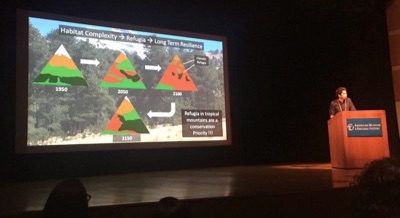Campus News
ENVS doctoral candidate Paulo Quadri takes top honors for NYC talk
Paulo Quadri, a doctoral candidate in environmental studies, was recognized for giving one of the three best talks during the American Museum of Natural History’s annual Student Conference on Conservation Science.

Paulo Quadri, a doctoral candidate in environmental studies, was recognized for giving one of the three best talks during the American Museum of Natural History’s annual Student Conference on Conservation Science.
Quadri was one of nearly 90 student speakers who delivered 15-minute presentations about their research during the conference, which is organized by the museum’s Center for Biodiversity and Conservation.
In his talk, “Natural History in the Age of Climate Change,” Quadri shared his fascination with the biodiversity of trees in the tropical mountains of Mexico. Quadri’s natural-science research focuses on the impacts of climate change on high-elevation tropical trees. During his talk, he described studying the growth rings of trees to explore changes in growth patterns and tree distribution over 150 years.
“I love mountains, and tropical mountains are the most biodiverse places on the planet,” said Quadri. “The growth rings are an open book that tells how a tree has changed over time.”
Using sophisticated techniques, Quadri is able to study growth rings, “pick a year,” and learn from the trees whether that year was warm, cold, wet, dry, or heavily polluted. “You can travel back in time by studying them,” he said. “You can identify growth shifts by habitat, and learn why those shifts were happening.”
The effects of climate change are hidden in trees, he added. Trees that used to grow well on a warm, south-facing slope may no longer thrive as overall temperatures increase, while warmer temps may give a boost to trees growing on cooler, north-facing slopes. Monitoring and understanding those changes, and how they impact the distribution of trees and species, offers clues to for conservationists.
“When you go out as an ecologist and detect these patterns, you’re seeing history in the making. It’s important to know where these mountain refugia are going to develop in the future to help us preserve species and protect biodiversity,” he said, using a Latin technical term for habitats where species can persist under adverse climate conditions.
Quadri gave his talk before a crowd of 200 or so conference attendees. He said his adviser, biology professor Erika Zavaleta, has been a great mentor. “She’s really supportive and good at giving public talks,” he said, adding, with a laugh, “I didn’t know there were going to be judges at the conference—which probably was a good thing.”